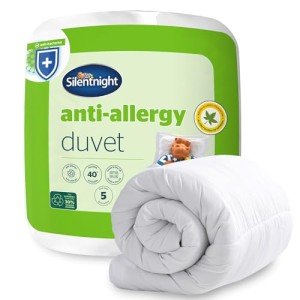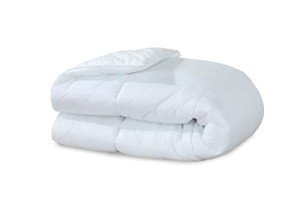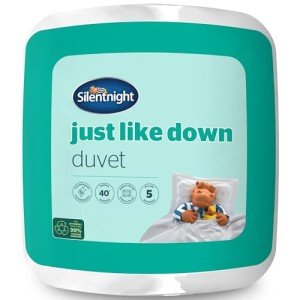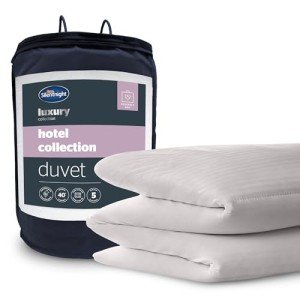Finding the perfect duvet is essential for a good night's sleep, especially for those who suffer from allergies. The anti-allergy double duvet is an optimal solution, providing comfort while helping mitigate allergy symptoms. This guide delves into the benefits of using an anti-allergy duvet, its features, and how to choose the right one for your needs.
What is an Anti-Allergy Duvet?
An anti-allergy duvet is specifically designed to reduce the accumulation of allergens, such as dust mites, mold, and pet dander. This type of bedding is beneficial for individuals who suffer from allergies or asthma, as it creates a healthier sleeping environment. The materials used in these duvets often repel or inhibit the growth of allergens, ensuring a cleaner and more comfortable sleep experience.
Key Features of Anti-Allergy Duvets
Anti-allergy duvets come with various features that cater to comfort and cleanliness. Here are some of the key features:
- Hypoallergenic Materials: These duvets are often made from synthetic fibers or treated natural materials that repel allergens.
- Dust Mite Resistant: They are designed to be less hospitable to dust mites, a common trigger for allergy sufferers.
- Easy to Clean: Many anti-allergy duvets can be machine washed and tumble dried, making them easier to maintain than traditional bedding.
- Breathability: High-quality anti-allergy duvets allow for airflow, preventing overheating while you sleep.
- Lightweight Yet Insulating: They provide warmth without adding unnecessary weight, making them suitable for year-round use.
Benefits of Using an Anti-Allergy Duvet
-
Reduced Allergy Symptoms: The primary benefit is the reduction in allergens, leading to fewer allergy symptoms such as sneezing, coughing, and nasal congestion.
-
Improved Sleep Quality: With a cleaner sleep environment, individuals may experience deeper and more restorative sleep, leading to increased energy levels during the day.
-
Maintenance of Hygiene: Regular cleaning of the duvet is simple, which keeps allergens at bay and prolongs the duvet's life.
-
Comfort and Warmth: Anti-allergy duvets are designed to be cozy and warm without sacrificing breathability.
How to Choose the Right Duvet
Choosing the right anti-allergy duvet involves considering several factors. Here’s a useful checklist:
-
Material: Look for materials that are labeled hypoallergenic. Common materials include microfiber, polyester, and specially treated cotton.
-
Fill Power: This refers to the fluffiness and insulation capability of the duvet. Higher fill power means better insulation while remaining lightweight.
-
Weight: Consider the weight of the duvet, especially if you prefer a lighter blanket or if you tend to feel hot while sleeping.
-
All Season Use: Opt for a duvet that can be used year-round, typically marked as a 4.5 tog or 10.5 tog duvet.
-
Ease of Care: Ensure that the duvet is machine washable for easy maintenance.
A Comparison Table of Popular Anti-Allergy Duvet Options
| Duvet Type | Material | Tog Rating | Machine Washable | Price Range |
|---|---|---|---|---|
| Microfiber Duvet | 100% Polyester | 4.5 - 13.5 | Yes | £50 - £200 |
| Bamboo Duvet | Bamboo Fibers | 4.0 - 10.5 | Yes | £60 - £250 |
| Hollowfibre Duvet | Hollowfibre | 10.5 | Yes | £40 - £150 |
| Duck Down Duvet | Duck Down/Synthetic blend | 4.5 - 9.0 | Yes | £100 - £300 |
| Wool Duvet | Wool | 9.0 | Yes | £80 - £250 |
FAQs About Anti-Allergy Duvets
1. How often should I wash my anti-allergy duvet?
It is recommended to wash your duvet every 3-6 months, but if allergies are a significant concern, more frequent washing may be beneficial.
2. Can I use an anti-allergy duvet even if I don't have allergies?
Yes, even if you don’t have allergies, these duvets can still offer comfort and a hygienic sleeping environment.
3. Do all anti-allergy duvets offer the same level of protection?
No, the level of protection may vary based on the materials used and the manufacturing process. Always check product reviews and specifications.
4. What are the best materials for an anti-allergy duvet?
Hypoallergenic materials like microfiber, bamboo, and specially treated cotton are excellent choices for an anti-allergy duvet.
5. Are there any other bedding items that can help with allergies?
Yes, pillow protectors, mattress encasements, and allergen-proof covers are also effective in reducing exposure to allergens.
An anti-allergy double duvet provides a comfortable and effective solution for those who are sensitive to allergens in their sleeping environment. By understanding its features, benefits, and selection criteria, consumers can make an informed choice that enhances their sleep quality and overall health. Investing in the right bedding not only promotes restful sleep but also contributes to a healthier daily life, making it worthwhile for any household.







